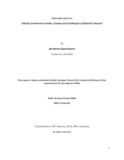| dc.contributor.advisor | Ahmed, Riyashad | |
| dc.contributor.advisor | Hossain, Saif | |
| dc.contributor.author | Sayed Shovan, Abu Roman | |
| dc.date.accessioned | 2023-03-27T04:38:32Z | |
| dc.date.available | 2023-03-27T04:38:32Z | |
| dc.date.copyright | 2022 | |
| dc.date.issued | 2022-03-02 | |
| dc.identifier.other | ID: 19104204 | |
| dc.identifier.uri | http://hdl.handle.net/10361/18011 | |
| dc.description | This internship report is submitted in partial fulfillment of the requirements for the degree of Bachelor of Business Administration, 2022. | en_US |
| dc.description | Cataloged from PDF version of internship report. | |
| dc.description | Includes bibliographical references (page 43). | |
| dc.description.abstract | This report is written as a part of completion of the BBA program. This paper aims to scrutinize
and provide a brief idea about Islamic investment procedures and the challenges and scopes of
the Islamic/ Shariah based banking faces from both national and global perspective. One of the
objectives of the paper is to address the differences between conventional banking and Islamic
banking, focusing mainly on the current status and future potential of Islamic finance and
banking, comparing Bangladesh along with other Muslim majority counties, thriving in Islamic
finance.
This interim report includes the financial performance of EXIM banks, depicting the overall
performance of EXIM bank as an Islamic bank. Exim Bank was incorporated as a public limited
company on 2nd June, 1999 under the company Act of 1991. It started it operations from 3rd
August, 1999 with the name “Bengal Export Import Bank Limited”, which was later change to
“Export Import Bank of Bangladesh Limited”. From July 2004, with the consent of the central
bank, EXIM Bank migrated to shariah based Banking from conventional banking.
The first chapter provides all the relevant information about the internship program. It details
about on-site supervisor’s information, duties and responsibilities, shared knowledge gathered
during the period, which are briefly described. Besides, it also covers how the on-site
responsibilities have benefited me and my contribution to the company. Moreover, the
difficulties and problems during the program, followed by some recommendations.
The second chapter focuses on organizational aspect, detailing mission, vision, overview of the
company, leadership style, organizational practices and culture of the company, financial
performances, organizational hierarchy and so on.
Lastly, the Third chapter describes the different Islamic investment modes based on Islamic
tenets, and how Islamic finance tends to be different from conventional banking at the core.
Based on various secondary sources, I tried to portray the current status of Islamic finance within
the banking industry along with the challenges and scopes of Islamic finance form macro and
micro perspective. Based on the factors that’s negating the overall efficiency and effectiveness
of Islamic financial institutions, I have made some recommendations which might be well fitting
to the current challenges. | en_US |
| dc.description.statementofresponsibility | Abu Roman Sayed Shovan | |
| dc.format.extent | 43 pages | |
| dc.language.iso | en | en_US |
| dc.publisher | Brac University | en_US |
| dc.rights | Brac University Internship reports are protected by copyright. They may be viewed from this source for any purpose, but reproduction or distribution in any format is prohibited without written permission. | |
| dc.subject | Islamic investment modes | en_US |
| dc.subject | Shariah Finance | en_US |
| dc.subject.lcsh | Banks and banking | |
| dc.subject.lcsh | Banks and banking--Religious aspects--Islam | |
| dc.title | Islamic investment modes, Scopes and challenges of Shariah Finance | en_US |
| dc.type | Internship report | en_US |
| dc.contributor.department | Brac Business School, Brac University | |
| dc.description.degree | B. Business Administration | |

